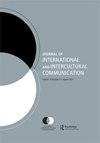了解加拿大一所大学中国际学生和本国学生之间的友谊
IF 2.2
Q2 COMMUNICATION
Journal of International and Intercultural Communication
Pub Date : 2020-01-02
DOI:10.1080/17513057.2019.1609067
引用次数: 18
摘要
加拿大以多元文化著称,是国际学生的主要接收国。国际学生的成功融入在一定程度上依赖于与东道国学生积极的社会互动和友谊的形成,这与各种积极的结果有关。然而,与现有的研究一致,我们发现国际学生与本国公民和其他国际学生建立了最亲密的友谊。基于对加拿大一所大学的国际学生的调查回应和深入访谈,本研究解释了为什么国际学生没有利用机会与东道国学生建立友谊,和/或为什么现有的友谊机会不足以形成深厚的友谊。学生们的反应最好用成本/收益分析来解释。虽然在加拿大的大学里有互动的机会,但对国际学生来说,互动的限制被认为是昂贵的,这加强了文化界限,并为跨文化友谊的形成创造了障碍。本文章由计算机程序翻译,如有差异,请以英文原文为准。
Understanding friendship formation between international and host-national students in a Canadian university
ABSTRACT Canada is known for its multiculturalism and is a major receiving country for international students. The successful integration of international students relies to some extent on positive social interaction and friendship formation with host-national students, which has been linked to a variety of positive outcomes. Nevertheless, consistent with existing research, we discover that international students develop their closest friendships with co-nationals and other international students. Based on survey responses and in-depth interviews with international students at one Canadian university, this study explains why international students are not taking advantage of opportunities to form friendships with host-national students, and/or why the friendship opportunities available are inadequate for deep friendship formation. Students’ responses might best be explained in terms of a cost/benefit analysis. Although interaction opportunities at Canadian universities exist, interaction constraints that are seen as costly to international students reinforce cultural boundaries and create barriers to intercultural friendship formations.
求助全文
通过发布文献求助,成功后即可免费获取论文全文。
去求助
来源期刊

Journal of International and Intercultural Communication
COMMUNICATION-
CiteScore
3.80
自引率
12.50%
发文量
19
 求助内容:
求助内容: 应助结果提醒方式:
应助结果提醒方式:


